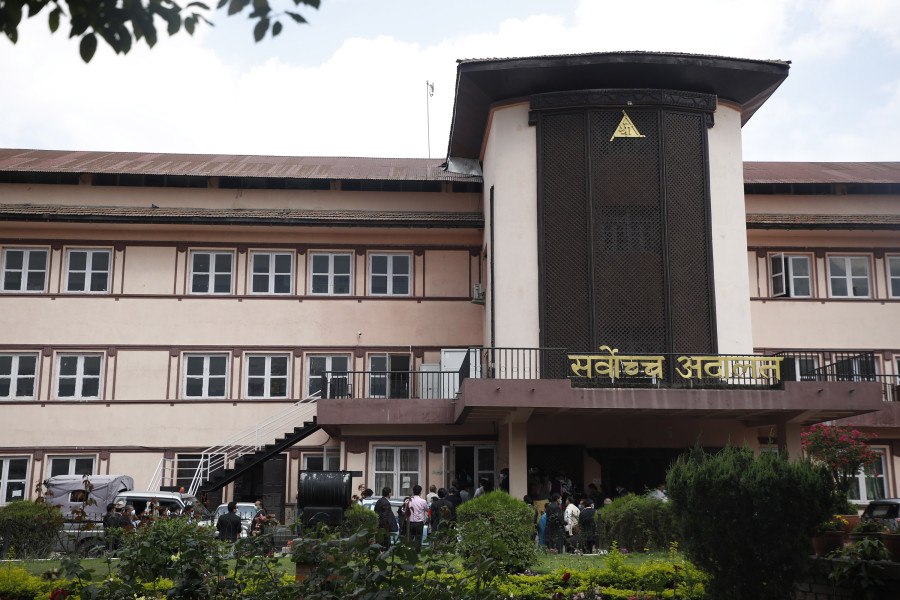National
Constitutional Bench to decide the fate of 30 petitions
Petitioners wanted an extended full bench to look into the case of House dissolution.
Binod Ghimire
The Constitutional Bench of the Supreme Court will decide the fate of 30 petitions against President Bidya Bhandari’s dissolution of the House of Representatives and rejection of the claim of Nepali Congress President Sher Bahadur Deuba for the post of prime minister.
Conducting a preliminary hearing on 19 petitions on Thursday, a single bench of Chief Justice Cholendra Shumsher Rana decided to send them to the Constitution Bench. Eleven other petitions were directly registered at the Constitutional Bench.
“The single bench of Chief Justice Rana has decided to send all the petitions related to the House dissolution to the Constitutional Bench,” Kishor Poudel, a communication expert at the Supreme Court, told the Post. “Hearings on the 19 petitions will be conducted by the Constitutional Bench along with 11 other petitions that were directly filed to the bench.”
Rana decided to send the 19 petitions to the Constitutional Bench, rejecting the demand of the petitioners to constitute an extended full bench comprising at least 11 justices of the Supreme Court to decide on the matter. The petitioners including Lokendra Oli had argued that an extended full bench was necessary to decide on the matter as the February 23 verdict of the Constitutional Bench, which said the Lower House can be dissolved only after going through the government formation process following Articles 76 (1), 76 (2), 76 (3) and 76 (5), was breached by the President.
But President Bhandari, on the recommendation of Prime Minister KP Sharma Oli, dissolved the House on Friday night without letting Article 76 (5) to come into full play. Rana also refrained from issuing an interim order against the dissolution as demanded by advocate Badri Bhatta. Bhatta had argued that as the decision to dissolve the House flouted the February 23 verdict, the court should issue an interim order for its continuation. “Oli has violated the February 23 order,” he said. “The court should issue an interim order directing resumption of the House.”
Senior Advocate Dinesh Tripathi had also demanded the scrapping of the House dissolution decision and an order against Oli to appear at the court for his justification. “The House of Representatives has been dissolved even before the full text of the previous verdict to reinstate the House has been made public,” he said. “The court should, therefore, assume that the House hasn’t been dissolved and ask it to perform its regular job.”
Some of the petitioners also had demanded an interim order against the dissolution and a House meeting to present the national budget.
Rana, after listening to the opening arguments from the petitioners, decided to send all the petitions to the Constitutional Bench saying they demand a detailed interpretation of the constitutional provisions.
As per the constitution, the government must present the federal budget at the federal parliament on Jestha 15, which is May 29 this year.
Since there is no Parliament, the government is planning to bring the budget through an ordinance.
According to court officials, the Constitutional Bench will start hearings on the petitions from Friday.
The constitution envisions a five-member Constitutional Bench, which is led by Chief Justice Rana. The members of the bench are selected by Rana.
President Bhandari late on Friday night dissolved the Parliament on the recommendation of Prime Minister Oli. Earlier on Friday evening, Bhandari rejected the claims of both Oli and Deuba for the prime ministerial post, saying the “claims were insufficient.”
The President has called snap polls for November 12 and 19.
This is the second time in five months Bhandari dissolved the House on Oli’s recommendation.
Earlier on December 20, the President dissolved the Parliament and called snap polls for April 30 and May 10. However, two months later, the Rana-led Constitutional Bench on February 23 overturned the decision and reinstated the House.
The fresh dissolution follows a series of actions by Oli.
After rendering the House, whose first meeting was held on March 7 after it was restored by the court, dysfunctional for two months, Oli on May 10 went for a floor test. He failed. But on May 13 he was appointed prime minister again under Article 76 (3) after opposition parties failed to prove a majority to form a new government under Article 76 (2).
But instead of making a bid to secure the confidence of the House, as mandated by the constitution, Oli on May 20 prodded the President into invoking Article 76 (5), a move that constitutional experts say is unconstitutional and illegitimate.
Oli argued that there was no political ground for him to secure a vote of confidence in the House.
Bhandari gave until 5pm of May 21 to form a new government under Article 76 (5). Congress President Deuba laid claim to a new government with the signatures of 149 lawmakers. But Oli again made a claim, saying he had the backing of 153 lawmakers. He did not provide signatures of the lawmakers.
The President disqualified both the claims.
On Monday, as many as 146 members of the dissolved House jointly filed a petition arguing that the House dissolution was unconstitutional and the President bulldozed the constitution by rejecting Congress President Deuba’s claim for prime minister.
The petition has signatures of 61 members from the Nepali Congress, 49 from the Communist Party of Nepal (Maoist Centre), 23 from the Madhav Nepal faction of the CPN-UML and 12 from the Upendra Yadav-Baburam Bhattarai faction of the Janata Samajbadi Party. The only member from Janamorcha Nepal who was in the House has also signed the petition.




 13.12°C Kathmandu
13.12°C Kathmandu














